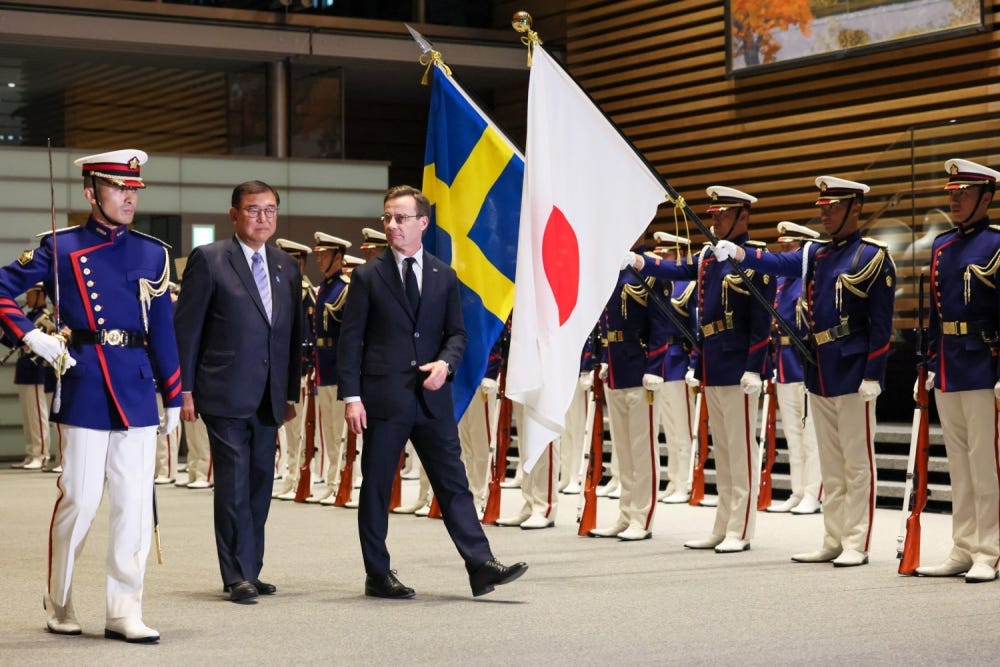Sweden-Japan: Strategic Partnership
Swedish delegation in Tokyo to improve collaboration between Japan and Sweden. The other half of the trip had to be cancelled because of the attempted coup in South Korea.
Swedish Prime Minister Ulf Kristersson visited Japan this week. The meeting with Japanese Prime Minister Shigeru Ishiba concluded with a formal communique.
Japan and Sweden upgrades their relations to a strategic partnership, aiming at a strengthened formal focus on industrial, political and security-related collaboration.
The two leaders attended a salute and guard of honor ceremony, followed by a summit meeting. Afterwards, the leaders held a working dinner. (PM Office of Japan, photo)
Kristersson says in an interview with Japan public media NHK, that the relationship need to be upgraded, because there is an increasing awareness in Japan as well as in Sweden that the security situation is increasingly similar. The new situation with Russia behaving more like an active threat to European countries is also noted in Japan. Because of geopolitical changes, Russia is now also a potential threat to Japan, and the two countries agree on more collaboration to counter this new threat.
At the start of the talks, Ishiba said Sweden's accession to NATO has drawn much attention in Japan. He added that Japan wants to deepen security cooperation with Sweden. Kristersson responded that the two countries have a strong relationship. They shared concerns over the military cooperation between Russia and North Korea. They agreed to continue to work together in imposing sanctions against Russia and providing assistance to Ukraine. They also confirmed that the two countries will promote cooperation based on their agreement on the transfer of defense equipment and technology.
Between the lines, it is worth noticing:
Sweden has industrial interests that can be expanded with the help of Japan. Especially in armaments, telecoms and electric vehicles. The severe problems with the European battery prestige project Northvolt in Sweden is urgent. Japan has been asked for technology and support to bring the factory back on track after severe problems involving Chinese equipment and expertise.
Japan is interested in learning about joining NATO after a long period of alliance free independence. Sweden just joined NATO after many years of self-declared strategic independence and is freshly adapting to the new situation. Ishiba, when he took over the premiership, mentioned that creating some kind of NATO organization in the Far East is a priority of his. The exchange of experiences could be used for this purpose.
Sweden would like to see more export to Japan, including of military technology and of telecommunications equipment. The industry, including the all-important Wallenberg family interests were present and eager to meet their colleagues and possible government buyers of Swedish products from industrial partners.
Interestingly - in the joint statement, there is no mention of China’s collaboration with Russia, at all. There is mention of a shared worry about nuclear weapons and of China’s activities in the South China Sea, but not anything clearly connecting China to Russia’s war in Ukraine.
Among other issues mentioned in the joint statement is green transition which is an EU priority and one where Sweden claims a leading role, although without mention of specific initiatives. With Japan is it surely an industrial effort, not agriculture or services, IT.
Ukraine of course also mentioned but no real concrete initiatives or widening of any existing collaboration there.
An official statement from the Swedish government also says:
In a joint statement with Prime Minister Shigeru Ishiba of Japan, Prime Minister Ulf Kristersson has announced a new strategic partnership between Sweden and Japan.
- Sweden and Japan have strong friendships. Our diplomatic relations stretch back over 150 years. The strategic partnership between Sweden and Japan takes the relationship between our countries to a new level, and paves the way for long-term cooperation in security and defence, trade and investment as well as research and innovation, says Prime Minister Ulf Kristersson.
The partnership was announced in connection with the Prime Minister's visit to Japan. The trip is part of the government's ambition to strengthen relations with countries in the Indo-Pacific region and is an important part of the preparations for Sweden's participation in the World Exhibition in Osaka in 2025. Japan is Sweden's second largest export market and third largest trading partner in Asia.
During the visit, Energy and Industry Minister Ebba Busch also signed a bilateral memorandum of understanding with her Japanese counterpart. That agreement aims to deepen Sweden's and Japan's cooperation in energy and innovation.
Cancelled visit to South Korea
The Swedish delegation had planned to travel on to South Korea for an official visit on 5-7 December. It had to be cancelled because of the coup attempt by President Yoon Suk-Yeol.
The other Swedish ministers in the delegation were:
Energy and Industry Minister Ebba Busch (Christian Democrats), Defense Minister Pål Jonson (Conservative-liberals) and Aid and Foreign Trade Minister Benjamin Dousa (Conservative-liberals). Ebba Busch says that it is "deeply regrettable" that the visit will not take place. “We are following developments very closely and look forward to being able to visit South Korea at a later date. It is an important cooperation country for us in terms of innovation and energy,” she says.




